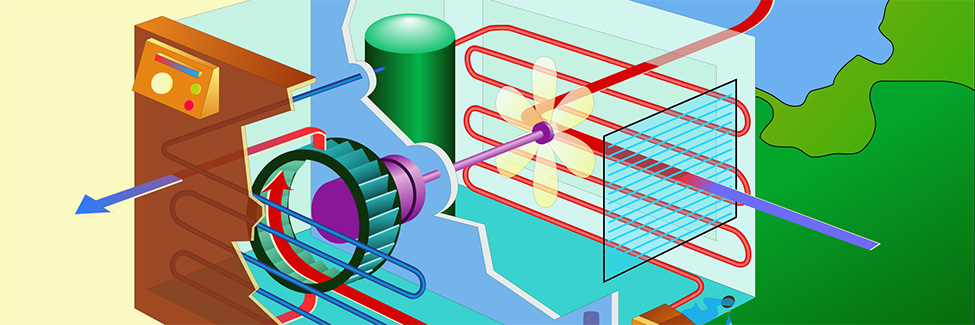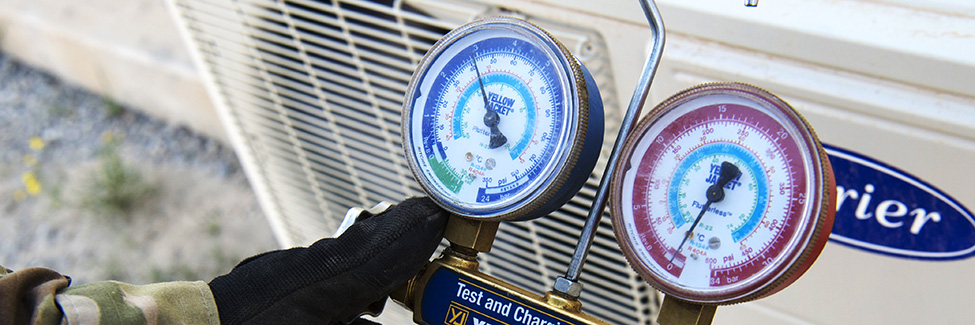
What Does HVAC Stand For?
It’s easy to take air conditioning and indoor heating for granted.
You might not give much thought to the temperature of your own home beyond changing the thermostat, but when your HVAC system breaks down, it becomes very apparent. Understanding what HVAC means its various related services can ensure your indoor air quality is great while also protecting your health.
HVAC stands for heating, ventilation, and air conditioning. Good HVAC systems do more than simply cool or warm your home’s interior. They also work to remove excess humidity inside of your home and filter allergens. This improves overall indoor air quality to both increase comfort and general health.
How Did HVAC Begin?
Humans have been heating and cooling homes for millennia, using everything from the sun, wind, water, and earth. However, our modern HVAC systems were invented just over one hundred years ago.
Willis Carrier, an engineer, invented the first air conditioner in 1902 to control the humidity in the factory where he worked. He invented a centrifugal chiller in 1922, which allowed the size of the air conditioner to be reduced. This was introduced to the public in 1925 in the Rivoli Theater in New York, leading people to go to the movies during the summer months to cool off. Modern HVAC systems can heat and cool homes and buildings, and there are several types of systems from which you can choose.
Types of HVAC systems
There are several modern types of HVAC systems, including the following:
Single-stage HVAC systems
Multi-stage HVAC systems
Zoned HVAC systems
HVAC systems with built-in humidity control
Furnaces and boilers
Split cooling systems
Swamp coolers
Single-stage HVAC systems have one level of heat or cold output and are controlled with single-stage thermostats. These are more popular in areas with cold climates and those that are hot and humid. However, single-stage systems run at their maximum level all of the time. Multi-stage HVAC systems have more than one cold and heat output levels and might allow you to save energy and money.
Zoned HVAC systems contain valves in the ductwork that allow you to heat or cool specific areas of your home. These work by allowing you to block the airflow to certain rooms. For example, if you want to turn off the heat to the upstairs of your home during the daytime, you can block the airflow to that area of your home with a zoned HVAC system.
Some HVAC systems offer built-in humidity controls, including dehumidifiers or humidifiers. If you live in a very dry climate, choosing a system with a humidifier is a good idea. Conversely, if you live in an area with high humidity, a system with a dehumidifier is ideal.
Furnaces send heated air through the ductwork and might use propane or gas for fuel. Boilers heat water for baseboards or radiators and might use oil or gas for fuel. There are also all-electric furnaces, all-electric heat pumps, and radiant floor systems.
Split cooling systems have portions placed outside and inside. The outdoor part of a split system is the air compressor or condenser. Inside, split systems will have air handling units or evaporators.
Swamp coolers are used in arid climates. These systems cool the outside air by passing it over pads that are soaked in water, which forces the water to evaporate into the air and cool it. The cooled air is then passed into the homes.
Energy efficiency
According to the U.S. Department of Energy, Americans spend $14 billion on HVAC services and repairs each year. On average, three million HVAC systems are installed or replaced each year. People who replace their HVAC systems with new, energy-efficient systems can reduce their use of energy by as much as 50% for electric systems or 10% for gas systems. Choosing HVAC systems that are Energy Star certified can help to save money on your utility costs. It is a good idea to think about replacing your system if it is more than 10 years old, breaks down frequently, or is no longer efficiently cooling or heating your home.
HVAC systems have transformed the way in which we live. People no longer have to sweat through the summer months and work hard to heat their homes in the winter. HVAC systems also help to improve the air quality of homes and businesses and protect people’s health.
Still have questions? Ask an HVAC expert directly via chat or phone.
Published on 2020-01-29 by Ben Travis
Last updated on 2020-01-29


